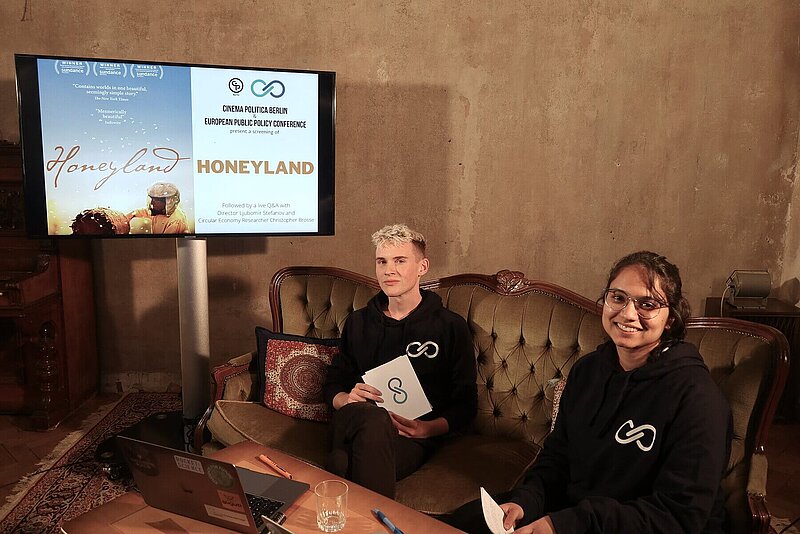
For three days, online attendees engaged with policymakers and practitioners.
On 23-25 April, nearly 200 attendees gathered online in the 12th annual European Public Policy Conference (EPPC), organised as always by Hertie School master's students. This year's theme was circular economy, and participants had a chance to hear from, and speak with, leading experts, policymakers and practitioners in the field.
How about There were roughly 180 attendees from 40 countries and various universities, along with 28 speakers and facilitators. Topics ranged from digitalisation to city-level governance, and speakers came from a variety of backgrounds, from Michael Oliveira of the Ellen MacArthur Foundation to Rozalina Petrova, Cabinet Member for the Commissioner for the Environment, Oceans and Fisheries at the European Comission.
The organisers put a high priority this year on featuring a voices from many parts of the world, and a wide range of topics. "There’s a reason why we have a panel specifically for Latin American countries, because we want to hear these voices. Coming from the Global South, this was personally very important for me. We don’t want to be in an echo chamber and not know about things that are happening beyond Germany or Europe,” said first-year Master of Public Policy student and organising team member Diksha Choudhary, who is from India.
One attendee was Victor Rorato, first-year MPP student from Brazil with a professional background in law. For him, a highlight from the weekend was the screening of the film Honeyland, an intimate portrait of a Macedonian beekeeper in a remote village. The EPPC screened it with the Hertie School's film club, Cinema Politica. "[The film] made me think about circular economy in the context of traditional communities with their lifestyle, and it made me think that our idea of sustainability or circular economy is not necessarily the right one," Rorato said. The screening was followed by a discussion with one of the directors.
After the 2020 conference was cancelled due to the pandemic, students shifted gears in the fall to prepare for an online event in 2021. "We were 16 people who didn’t even know each other, but we shared similar values and interests in topics of development and were motivated to take this project forward," said Choudhary. To raise interest, they put on a kick-off talk in March on the topic of circular economy, featuring Hertie School Postdoctoral Researcher Sebastian Levi, a climate policy expert. Choudhary said she was pleased with how the conference went, despite the challenges of organising a compelling online event.
"This was one of the most successful editions of the European Public Policy Conference so far,” she said. “The team worked together relentlessly to ensure that the participants would have opportunities to interact with the speakers and policymakers, as well as to network with one another." The EPPC is organised annually by master's degree students at the Hertie School and sponsored by the IPLI Foundation. Each year, students come up with a public policy theme, decide on topics, invite speakers and organise workshops and discussions. Previously, the conference rotated to a new European capital, also chosen by the students, every year, but this year's edition was held virtually.
The Hertie School is not responsible for any content linked or referred to from these pages.
Views expressed by the author/interviewee may not necessarily reflect the views and values of the Hertie School.
